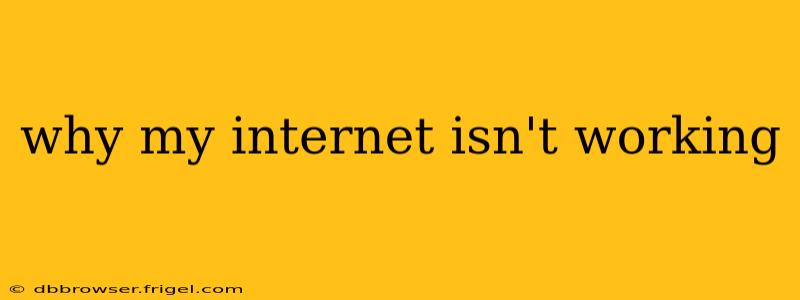Experiencing internet connectivity issues can be incredibly frustrating. From missed deadlines to interrupted streaming, a malfunctioning internet connection disrupts our daily lives. This comprehensive guide will walk you through troubleshooting common internet problems, helping you pinpoint the cause and restore your connection. We'll cover everything from simple fixes to more advanced troubleshooting steps.
Is it Your Entire Network or Just One Device?
This is the first crucial question to ask yourself. If all your devices – computers, phones, tablets – are offline, the problem likely lies with your internet connection itself. However, if only one device is experiencing issues, the problem might be isolated to that specific device.
Troubleshooting for Entire Network Down:
-
Check your modem and router: Are the power lights on and functioning correctly? A simple power cycle (unplug, wait 30 seconds, plug back in) can often resolve minor glitches.
-
Check your cables: Examine all cables connecting your modem, router, and devices for any damage or loose connections. Even a slightly loose cable can interrupt the signal.
-
Contact your Internet Service Provider (ISP): If restarting your equipment doesn't work, the issue may lie with your ISP's infrastructure. Call them to report the outage and inquire about any service interruptions in your area.
Troubleshooting for One Device Down:
-
Restart your device: The simplest solution is often the best. Restarting your computer, phone, or tablet can often clear temporary software glitches.
-
Check your Wi-Fi settings: Ensure your device is correctly connected to your Wi-Fi network and that the password is correct. Try forgetting and re-joining the network.
-
Check device-specific settings: For example, check if your firewall or antivirus software is blocking internet access.
Why is My Wi-Fi So Slow?
Slow internet speeds can stem from various factors. Let's explore some common causes and solutions:
-
Too many devices connected: A large number of devices simultaneously using your network can significantly reduce speeds for each. Try disconnecting unused devices.
-
Router placement: Your router's location plays a critical role in signal strength. Obstacles like walls, furniture, and appliances can interfere with the signal. Try relocating your router to a more central and open location.
-
Outdated router: An older router may not be able to handle the demands of modern internet speeds. Consider upgrading to a newer, more powerful router.
-
Interference from other devices: Devices operating on the 2.4 GHz frequency, like microwaves and cordless phones, can interfere with your Wi-Fi signal. Try changing your Wi-Fi channel to minimize interference.
-
ISP issues: As mentioned previously, problems with your ISP's infrastructure can also result in slow speeds.
Why is My Internet Connection Dropping Out?
Intermittent connection drops can be particularly frustrating. Here are some possible causes:
-
Weak Wi-Fi signal: As discussed earlier, a weak signal can lead to frequent drops.
-
Signal interference: Similar to slow speeds, interference from other devices can cause intermittent connection issues.
-
Router overload: A router struggling to handle heavy traffic can lead to dropped connections.
-
Driver issues: Outdated or corrupt network drivers on your computer can cause connectivity problems. Update your drivers to the latest version.
-
ISP problems: Again, contact your ISP to rule out service issues on their end.
What Should I Do If My Internet Still Isn't Working?
If you've tried all the above troubleshooting steps and your internet still isn't working, it's time to consider more advanced solutions:
-
Check your DNS settings: Incorrect DNS settings can prevent you from accessing websites. Try using public DNS servers like Google's 8.8.8.8 and 8.8.4.4.
-
Run a network diagnostic tool: Many operating systems have built-in network diagnostic tools that can help identify specific problems.
-
Contact your ISP for professional support: If you've exhausted all other options, contact your ISP for technical assistance. They have the tools and expertise to diagnose more complex problems.
This comprehensive guide should help you resolve most common internet connectivity issues. Remember, patience and systematic troubleshooting are key. By addressing each potential problem systematically, you'll significantly improve your chances of restoring your internet connection quickly and efficiently.
